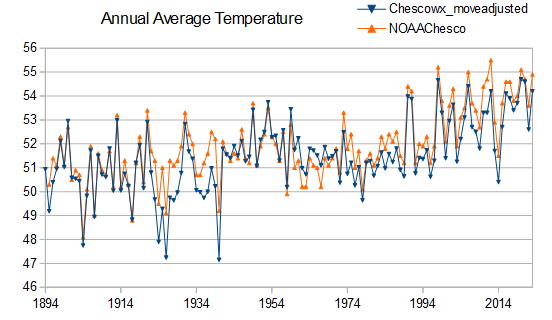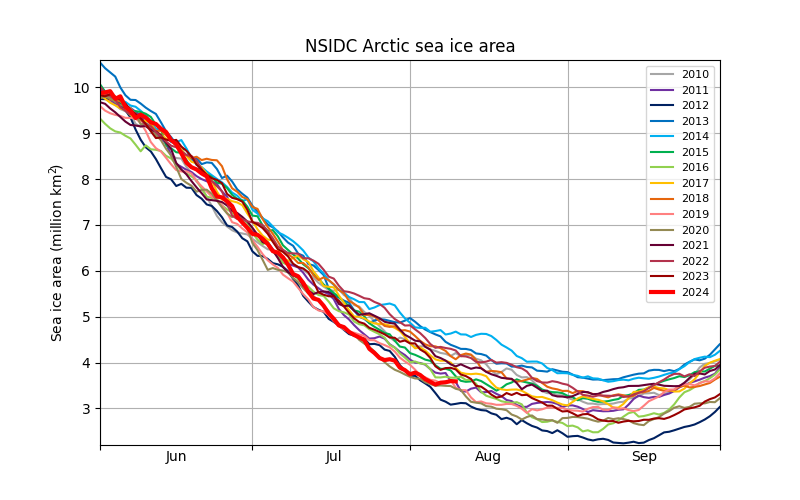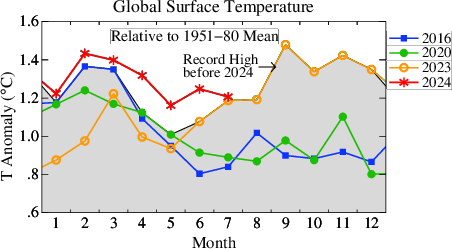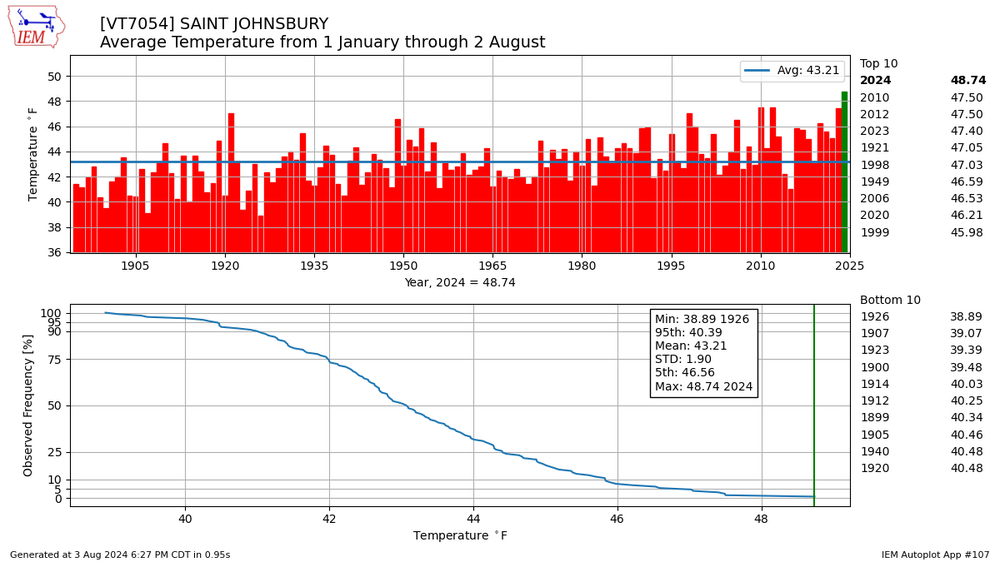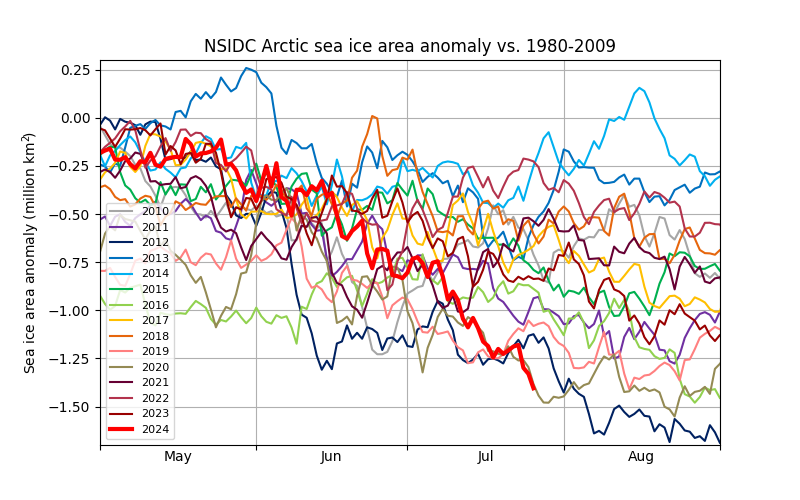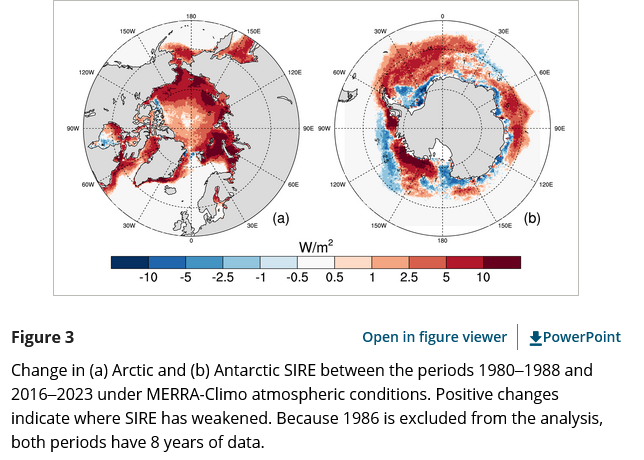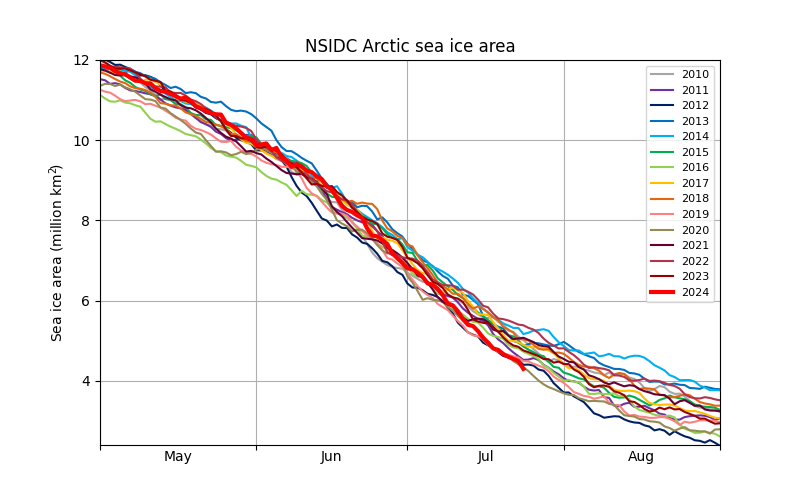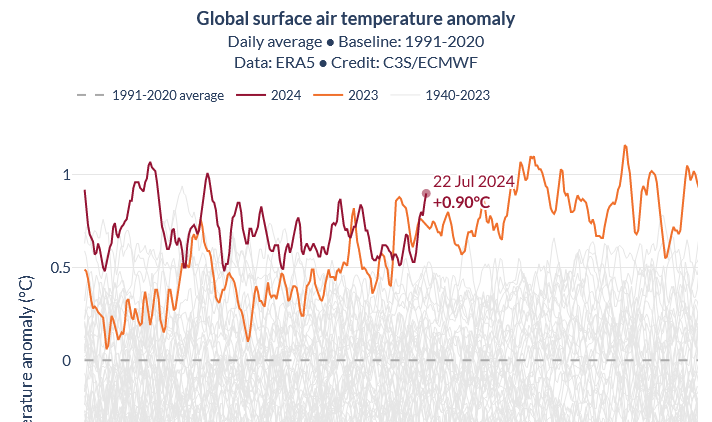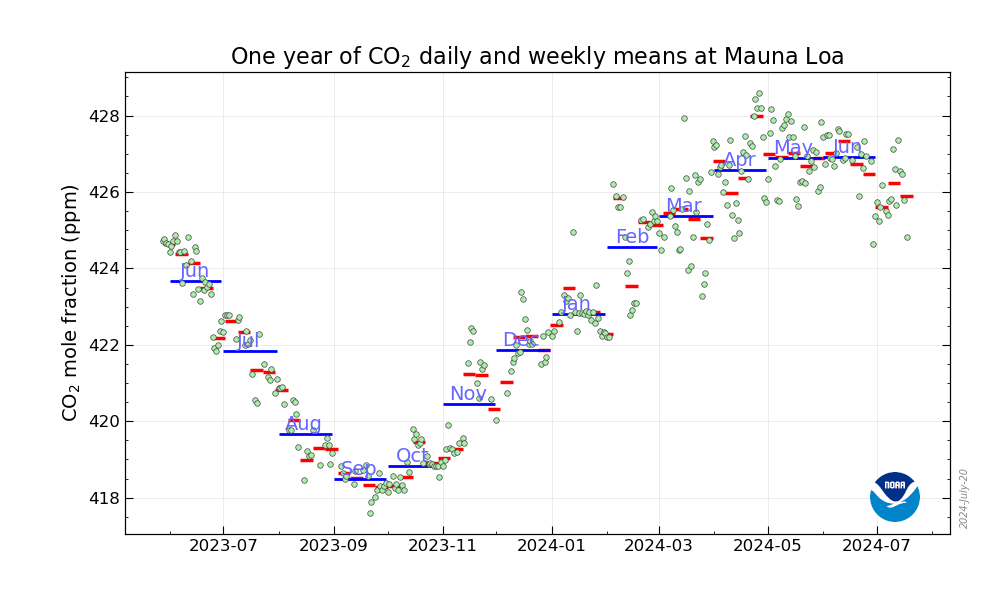
chubbs
Members-
Posts
4,070 -
Joined
-
Last visited
Content Type
Profiles
Blogs
Forums
American Weather
Media Demo
Store
Gallery
Everything posted by chubbs
-
Chester County PA - Analytical Battle of Actual vs. Altered Climate Data
chubbs replied to ChescoWx's topic in Climate Change
Below is Coatesville with a very rough adjustment for the town-->outside of town move, 2F phased in between 1946 and 48 (2 moves in that period). This single, crude, move adjustment removes most of the difference between NOAA and the raw data. The agreement isn't perfect, but you wouldn't expect it to be. Coatesville 1SW had multiple in town locations and Chescowx is 3 different sites (Coatesville 1SW, Coatesvelle 2W and East Nantmeal). Each move would have some impact on measured temperatures. There can be non-move station changes as well. With all the station moves at Coatesville and West Chester, you get a much better answer by accounting for station changes. -
-
GISS for July was 1.21 just edging 2023 for the 14'th straight monthly record. The last 2 months have been much warmer than 2016 and any pre-2023 year. The 2023/24 nino was fast to warm last year and is slow to cool down this year.
-
Sorry Paul! I posted the chart below previously. The move-related cooling is readily estimated from nearby stations. West Chester went from being like Phoenixville before the move in 1970, to being like Coatesville after, roughly 2F. The timing matches the station move exactly. Of course NOAA uses many more stations for a more robust estimate of the move's impact. Same story at Coatesville. A fact whether you accept or not.
-
Surprised that a heat island expert like yourself thinks that those town/city sites are representative. The Coatesville and West Chester station moves to more rural sites nearby caused roughly 2F of cooling. Accounting for the moves is why NOAA is spot on and you are way off.
-
And as usual, You've ducked my point. Do you think Phoenixville, the city of Coatesville, and the town of West Chester, are a good representation of Chester County?
-
The data lies if you don't use it properly. You have been putting out misinformation on our local climate for decades.
-
You are the guy who is altering our local climate. Phoenixville, the city of Coatesville, and the town of West Chester are a poor representation of Chester County. Much warmer than the county as a whole. No wonder you are so far off before the Coatesville and West Chester station moves.
-
This paper for fall AGU meeting indicates the earth's energy imbalance is the main reason this nino has been so warm. Note the rise in atmospheric heat content in 2024 due mainly to increasing water vapor content. https://agu.confex.com/agu/agu24/meetingapp.cgi/Paper/1553238
-
Amplified warming of North American cold extremes linked to human-induced changes in temperature variability "Here we show that cold extremes over North America have warmed substantially faster than the winter mean temperature since 1980. This amplified warming is linked to both decreasing variance and changes in higher moments of the temperature distributions. Climate model simulations with historical forcings robustly capture the observed trends in extremes and variability " "It is important to note that despite our results, winter cold extremes over North America will continue to occur. Winter tem- peratures over North America in the current climate have the highest variance57 and are some of the most strongly negatively skewed9,21 on Earth. This means that extreme deviations below the mean are expected to continue to occur in the future, even with rising global temperatures. However, because of the increasing mean temperatures, combined with the changes in temperature variability, cold extremes over North America will occur less frequently, and when they do occur, they will be less intense" https://www.nature.com/articles/s41467-024-49734-8.pdf
-
-
Area continues to tumble despite benign weather, as big Pacific losses continue. Clearly a 3 horse race now.
-
Per linked paper, the reflectivity of sea ice has decreased since 1980. SIRE in Figure below is sea ice radiative effect. The arctic decline has been steady, while the Antarctic experienced a regime change in 2016. "The planetary cooling effects of Arctic and Antarctic sea ice during 2016–2023 were about 20% and 12% less, respectively, than they were during 1980–1988. Disappearing sea ice is therefore amplifying climate change by causing Earth to absorb roughly an additional 0.3 W m−2 of solar power for each degree Celsius of global warming, a feedback that is stronger than that simulated by most climate models." https://agupubs.onlinelibrary.wiley.com/doi/10.1029/2024GL109608
-
Big area drop yesterday leaves 2024 #1. Area is jumpy and there was some flash melting ytday in the Beaufort that may come back to life in the next couple of days. Still this is turning out to be a big melt year. Key metrics like area and volume have been dropping fast since mid-June. Top 3 looking more and more likely.
-
With current spike in global temperatures, looking more and more like Hanson was right about a new record this year. We aren't seeing much of a drop in temperatures yet as we transition away from nino. Still clear of pre-2023 years.
-
Looks like typical Martz BS. Martz chart doesn't match NOAA or UAH6 satellite data (below). He's missing a lot of warming. Even NOAA is underestimating warming since 2012 if UAH6 is right. Of course there is no info on how Martz calculates the US average temperature. As we've seen with your "county averages", plenty of options for errors or other mischief. Merely averaging the data will skew the results as the US network has shifted in time. Per chart above I doubt that Martz is using a proper station weighting; i.e, 3 stations close together shouldn't get the same weight as one that doesn't have any close neighbors. That will weight populated areas too heavily. Another reason to discount Martz chart: bias adjustments on modern stations are very small, there shouldn't be a big discrepancy between raw and bias adjusted. Bdgwx has posted charts showing how well the recent US station data lines up with rural stations that are carefully selected to track climate changes. Our Chester County deep dive has shown that the Chester County bias adjustments are completely justified. The Chesco COOPs were biased warm and the problems could be easily identified by comparing to nearby sites. Stations were moved out of towns to cooler locations, experienced time of day bias, and ran warm at times probably due to shelter/location issues with non-aspirated thermometers. Finally If Martz has good scientific evidence he should publish in a technical forum. As discussed above I doubt the chart would survive a peer review. In the para above he is using handwaving arguments. His statements on TOBS smack of complete BS. We know that stations experienced TOBS because the observation times are known. The impact of TOBS has already been established in published papers that are linked in this thread. Instead of producing evidence, Martz is using name calling . In short he's following the denier playbook: misleading analysis, faulty logic, no evidence, name calling, etc.
-
LOL you want to get rid of the one station that hasn't moved. UHI warming? Phoenixville is on the water company reservoir property. Hasn't changed much at all as far as I can tell. West Chester and Coatesville have a reverse heat island effect. Both moved out of built up areas to cooler locations. Shows clearly in the station temperature data. Why don't you toss them instead? Your denier bias shows when you discuss NOAA's motivation. Complete BS on your part. NOAA is trying to get the right answer, using science, and succeeding. All the stations in Chesco are warming at about the same rate, including Phoenixville, and your house. NOAA splits the uprights. All Chesco raw data. No adjustments needed once we get past the big station moves.
-
Despite its warm spike in the 1930s-1950s, Phoenixville shows considerable warming over the past 130 years in-line with NOAA. The only long-term Chesco station that didn't move to a cooler location. 100% raw data. Our deep-dive over the past several months has supported NOAA 100%.
-
Not sure what point you are making in the first para, but you are focusing on unimportant points. The county or state borders are irrelevant and I haven't seen any "stations that don't exist". Sounds like a denier fairy tale. The West Chester adjustments in the 1940s are set by the 1970 move. The West Chester move caused roughly 2.4F cooling. I get an average adjustment in the 1940s of 2.2F. Again these adjustments are data driven. The chart I posted above showed the sudden West Chester cooling in 1970 relative to nearby stations. Easy to see where the bias adjustments for West Chester come from. Would bias the result if the "chilling" move was not accounted for. Your view of NOAA and science is a strawman.
-
Is concerning. The study linked above was based on 2023 data at Mauna Loa. Data so far this warm season shows an unusually small decline in CO2. We'll see if it can be explained by weather or some other factor.
-
First lets clear one thing up. NCEI doesn't chill anything. The bias adjustments come entirely from the data collected at other stations. The Coatesville station changes were identified by the other stations, not NOAA. If Coatesville didn't have changes vs other stations it wouldn't get bias adjustments. How do we know? The method has been well tested. Per chart below big changes occurred at Coatesville that were not related to station moves. and some moves had very little impact on temperatures. All based on comparison to other stations. Adding Sadsburyville doesn't change the fact that Coatesville had more 95 days than other stations in the region (95F days by decade below). Over time Coatesville changed from having more 95 days than Philadelphia and the Newark De Ag farm, to having roughly the same, to having less. Overall the 95 degree day data is consistent with the bias adjustments Coatesville receives through the years. The Doe Run Rd site should have fewer 95 days than Philadelphia. 95F days isn't the whole story of course, we've also seen that low temperatures dropped with the move to Doe Run Rd. There could have been other changes as well. You are the guy who is altering Chesco's climate information. While NOAA's method is proven, your is deeply flawed. It is well known that taking a simple average of a changing network skews the result. Not sure why it is so hard for you to accept that simple fact. Imagine thinking that the City of Coatesville, the town of West Chester and Phoenixville are a good representation for all of Chester County. Here's a homework assignment for you. Find current stations in the city of Coatesville, the town of West Chester, combine with Phoenixville and compare to your current network. I am betting that the average of those three stations will be much warmer than the county as a whole. We already know that Phoenixville is warmer.
-
Adjustments start from the present and work back in time. Since the rural Doe Run site is the most recent, it sets the baseline. The more urban sites are adjusted to match Doe Run.
-
My reading of the NCDC docs is that the station was located at or near the weather bureau office, which had several downtown locations from 1870s to 1950s when it moved to airport. Airport obs started in 1940 and there was some cooling based on a comparison to nearby sites.
-
As usual you are all talk and no evidence. Coatesville and West Chester had a clear reverse heat island effect. Moving from more to less urban sites. If there wasn't a "dust bowl" in Philadelphia or Delaware, there wasn't one in Chester Co.

